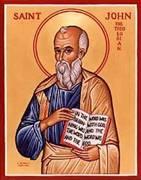John: From the Beginning
I, II, AND III JOHN
 Scripture verse (I John 1:1): “That which was from the beginning, which we have heard, which we have seen with our eyes, which we have looked upon, and our hands have handled, concerning the Word of life”
Scripture verse (I John 1:1): “That which was from the beginning, which we have heard, which we have seen with our eyes, which we have looked upon, and our hands have handled, concerning the Word of life”
Objectives:
- Students should know the basis from which the Christian faith stems.
- Students should be able to point to a clear difference between the basis for Christian faith and other religions: a real, live person (Jesus) vs. somebody’s nice-sounding (all right, wonderful-sounding) ideas
Background on the book:
Each of these letters was written by the apostle John, one of the twelve disciples and the author of the Gospel of John and the Revelation. John lived in Jerusalem with Mary the Theotokos until her death, then he moved to Ephesus. Remember that John was the only one of the apostles who died a natural death at an old age, probably around 100 years old. He ended his life in exile on the island of Patmos. I John was probably written about the time John wrote his gospel, about AD 90-95. II John and III John were also probably written around the same time. It is believed that John was writing to believers in Ephesus with his first letter; the 2nd and 3rd letters are more personal notes to friends he expected to visit shortly.
Possible Lesson Plan:
- Open with prayer.
- Review the background of the book. Where have we met John in the gospels? (fisherman, Transfiguration, “the disciple whom Jesus loved”, at the cross) Find Jerusalem, Ephesus, and Patmos on the map.
- Scripture lesson: Read I John 1: 1-4, II Peter 1:16-18. What were these two apostles trying so desperately to tell their younger followers? Both were near death when they wrote these epistles and had a deep desire that the generations to come have no doubts.
- What is the “basis” of many religions today? Review Islam (the writings of one man, Mohammed), Buddhism (the teachings of Buddha), Mormonism (the teachings of Joseph Smith), Hinduism (a mystical journey through reincarnation towards “nirvana”), Confucianism (the teachings of Confucius). What do these have in common? Are there any wise teachings or sayings in the holy books of these religions? Is there any salvation in Mohammed, Buddha, Confucius, etc.? Did even they claim to be God?
- Was Jesus a wise teacher? Brainstorm for some of His wise sayings and parables. Did He make other claims for Himself? Was He a liar when He said He was the Son of God? Who knew Jesus personally, lived and traveled with him? Who was present at the Transfiguration? (Peter, James, and John) Who was present at the Resurrection? At the Ascension? At Pentecost? Who went from being frightened men, hiding out after the death of their leader, to men who were willing to die for this Lord? Would you willingly die for a lie? Do you think John and Peter were telling the truth? How is Jesus different from Mohammed, Buddha, etc.? Do we follow a set of ideas, however good, or the Son of God?
- Pretend you are a newspaper writer, documenting an important event in the life of Jesus, as witnessed by John. From an old newspaper, cut out the words and paste them on a sheet of paper to make your own “Headline Story”.
- Close with prayer.